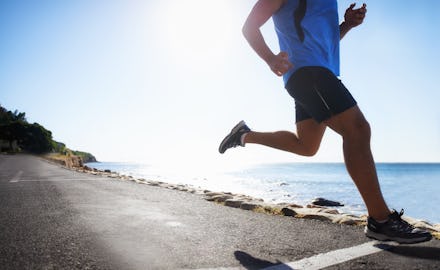Why does my throat hurt after a run?

Sometimes, after an endorphin-rich run outside, my throat feels dry, scratchy, and sore. This is kind of a problem because I run every day. For years, I have been sucking on lozenges as I run to preemptively combat this. It mostly works, but it’s only occurred to me recently that figuring out why my throat hurts after a run might be more effective than treating the symptoms with what is essentially herb-infused candy. So I looked into why this curious symptom shows up from time to time, post-workout.
First of all, a quick internet search and many experts confirmed that post-run sore throats are fairly common. Now more than ever, it’s important to figure out why before we all start diagnosing ourselves with coronavirus.
First off, experts agree that there could be many causes for this that have nothing to do with illness. If you run in a very dry environment, like the desert or a seriously air conditioned gym, the lack of humidity can make your throat dry, but humidity isn’t really a factor until it dips below 40%. Exercising in smoky air, which is unfortunately prevalent in many parts of the northwest right now, can also irritate the delicate membranes inside your mouth and throat.
But doctors tell me that the most common reason that your throat might hurt after you run isn’t an environmental one. “Your throat gets dry because you are breathing with your mouth open,” says Susan Besser, a Baltimore-based primary care physician. Breathing through your mouth when you exercise, says Besser, dries out your throat and mouth, especially when the humidity is low.
I asked Besser if it’s okay to use cough drops when I run. It will work, she says, but it’s not ideal. “A lozenge works because it forces you to keep your mouth closed and also forces more saliva production, both of which lubricate your throat,” says Besser, but adds that breathing with your mouth closed is a better way to deal. Cough drops just mask the problem and some people are a bit afraid of choking on them. Plus, some research suggests that breathing through your nose can help athletic performance.
It may require some training to switch to breathing through your nose while you work out, but Besser says that while you’re trying to change this habit, you could try wearing a mask. “The mask traps the moisture you are exhaling and allows you to rebreathe more moist air which cuts down on the dryness,” she says, and it has the added benefit of preventing the spread of COVID-19, and it may filter out some of the noxious fumes created by wildfires.